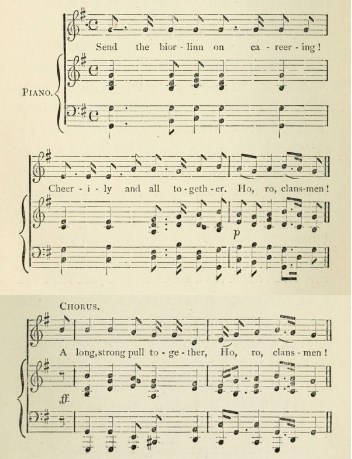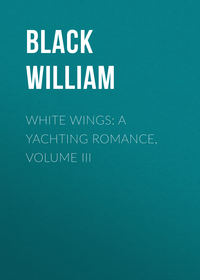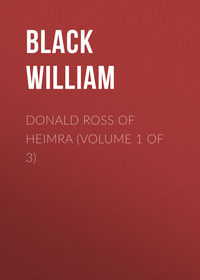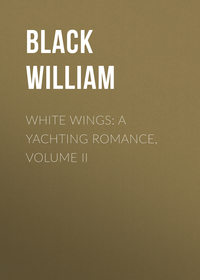
White Wings: A Yachting Romance, Volume I
"Oh, I am sure your imitation of the provincial Scotch is most excellent – most excellent – and it adds so much to the humour of the stories," says this disgraceful young hypocrite.
"Oh, ay, oh, ay," says the Laird, greatly delighted. "I will admit that some o' the stories would not have so much humour but for the language. But when ye have both! Did ye ever hear of the laddie who was called in to his porridge by his mother?"
We perceived by the twinkle in the Laird's eyes that a real good one was coming. He looked round to see that we were listening, but it was Mary Avon whom he addressed.
"A grumbling bit laddie – a philosopher, too," said he. "His mother thought he would come in the quicker if he knew there was a fly in the milk. 'Johnny,' she cried out, 'Johnny, come in to your parritch; there's a flee in the milk.' 'It'll no droon,' says he. 'What!' she says, 'grumblin again? Do ye think there's no enough milk?' 'Plenty for the parritch,' says he —kee! kee! kee!– sharp, eh, wasn't eh? – 'Plenty for the parritch,' says he – ha! ha! ho! ho! ho!" – and the Laird slapped his thigh, and chuckled to himself. "Oh, ay, Miss Mary," he added, approvingly, "I see you are beginning to understand the Scotch humour fine."
And if our good friend the Laird had been but twenty years younger – with his battery of irresistible jokes, and his great and obvious affection for this stray guest of ours, to say nothing of his dignity and importance as a Commissioner of Strathgovan? What chance would a poor Scotch student have had, with his test-tubes and his scientific magazines, his restless, audacious speculations and eager ambitions? On the one side, wealth, ease, a pleasant facetiousness, and a comfortable acceptance of the obvious facts of the universe – including water-rates and steam fire-engines; on the other, poverty, unrest, the physical struggle for existence, the mental struggle with the mysteries of life: who could doubt what the choice would be? However, there was no thought of this rivalry now. The Laird had abdicated in favour of his nephew, Howard, about whom he had been speaking a good deal to Mary Avon of late. And Angus – though he was always very kind and timidly attentive to Miss Avon – seemed nevertheless at times almost a little afraid of her; or perhaps it was only a vein of shyness that cropped up from time to time through his hard mental characteristics. In any case, he was at this moment neither the shy lover nor the eager student; he was full of the prospect of having sole command of the ship during a long night on the Atlantic, and he hurried us up on deck after dinner without a word about that return-battle at bezique.
The night had come on apace, though there was still a ruddy mist about the northern skies, behind the dusky purple of the Coolin hills. The stars were out overhead; the air around us was full of the soft cries of the divers; occasionally, amid the lapping of the water, we could hear some whirring by of wings. Then the red port light and the green starboard light were brought up from the forecastle, and fixed in their place; the men went below; Angus Sutherland took the tiller; the Laird kept walking backwards and forwards as a sort of look-out; and the two women were as usual seated on rugs together in some invisible corner – crooning snatches of ballads, or making impertinent remarks about people much wiser and older than themselves.
"Now, Angus," says the voice of one of them – apparently from somewhere about the companion, "show us that you can sail the yacht properly, and we will give you complete command during the equinoctials."
"You speak of the equinoctials," said he, laughing, "as if it was quite settled I should be here in September."
"Why not?" said she, promptly. "Mary is my witness you promised. You wouldn't go and desert two poor lone women?"
"But I have got that most uncomfortable thing, a conscience," he answered; "and I know it would stare at me as if I were mad if I proposed to spend such a long time in idleness. It would be outraging all my theories, besides. You know, for years and years back I have been limiting myself in every way – living, for example, on the smallest allowance of food and drink, and that of the simplest and cheapest – so that if any need arose, I should have no luxurious habits to abandon – "
"But what possible need can there be?" said Mary Avon, warmly.
"Do you expect to spend your life in a jail?" said the other woman.
"No," said he, quite simply. "But I will give you an instance of what a man who devotes himself to his profession may have to do. A friend of mine, who is one of the highest living authorities on Materia Medica, refused all invitations for three months, and during the whole of that time lived each day on precisely the same food and drink, weighed out in exact quantities, so as to determine the effect of particular drugs on himself. Well, you know, you should be ready to do that – "
"Oh, how wrong you are!" says Mary Avon, with the same impetuosity. "A man who works as hard as you do should not sacrifice yourself to a theory. And what is it? It is quite foolish!"
"Mary!" her friend says.
"It is," she says, with generous warmth. "It is like a man who goes through life with a coffin on his back, so that he may be ready for death. Don't you think that when death comes it will be time enough to be getting the coffin?"
This was a poser.
"You know quite well," she says, "that when the real occasion offered, like the one you describe, you could deny yourself any luxuries readily enough; why should you do so now?"
At this there was a gentle sound of laughter.
"Luxuries – the luxuries of the White Dove!" says her hostess, mindful of tinned meats.
"Yes, indeed," says our young Doctor, though he is laughing too. "There is far too much luxury – the luxury of idleness – on board this yacht to be wholesome for one like me."
"Perhaps you object to the effeminacy of the downy couches and the feather pillows," says his hostess, who is always grumbling about the hardness of the beds.
But it appears that she has made an exceedingly bad shot. The man at the wheel – one can just make out his dark figure against the clear starlit heavens, though occasionally he gets before the yellow light of the binnacle – proceeds to assure her that, of all the luxuries of civilisation, he appreciates most a horse-hair pillow; and that he attributes his sound sleeping on board the yacht to the hardness of the beds. He would rather lay his head on a brick, he says, for a night's rest than sink it in the softest feathers.
"Do you wonder," he says, "that Jacob dreamed of angels when he had a stone for his pillow? I don't. If I wanted to have a pleasant sleep and fine dreams that is the sort of pillow I should have."
Some phrase of this catches the ear of our look-out forward; he instantly comes aft.
"Yes, it is a singular piece of testimony," he says. "There is no doubt of it; I have myself seen the very place."
We were not startled; we knew that the Laird, under the guidance of a well-known Free Church minister, had made a run through Palestine.
"Ay," said he, "the further I went away from my own country the more I saw nothing but decadence and meesery. The poor craytures! – living among ruins, and tombs, and decay, without a trace of public spirit or private energy. The disregard of sanitary laws was something terrible to look at – as bad as their universal beggary. That is what comes of centralisation, of suppressing local government. Would ye believe that there are a lot of silly bodies actually working to get our Burgh of Strathgovan annexed to Glasgow – swallowed up in Glasgow!"
"Impossible!" we exclaim.
"I tell ye it is true. But no, no! We are not ripe yet for those Radical measures. We are constituted under an Act of Parliament. Before the House of Commons would dare to annex the free and flourishing Burgh of Strathgovan to Glasgow, I'm thinking the country far and near would hear something of it!"
Yes; and we think so, too. And we think it would be better if the hamlets and towns of Palestine were governed by men of public spirit like the Commissioners of Strathgovan; then they would be properly looked after. Is there a single steam fire-engine in Jericho?
However, it is late; and presently the women say good-night and retire. And the Laird is persuaded to go below with them also; for how otherwise could he have his final glass of toddy in the saloon? There are but two of us left on deck, in the darkness, under the stars.
It is a beautiful night, with those white and quivering points overhead, and the other white and burning points gleaming on the black waves that whirl by the yacht. Beyond the heaving plain of waters there is nothing visible but the dusky gloom of the Island of Eigg, and away in the south the golden eye of Ardnamurchan lighthouse, for which we are steering. Then the intense silence – broken only when the wind, changing a little, gybes the sails and sends the great boom swinging over on to the lee tackle. It is so still that we are startled by the sudden noise of the blowing of a whale; and it sounds quite close to the yacht, though it is more likely that the animal is miles away.
"She is a wonderful creature – she is indeed," says the man at the wheel; as if every one must necessarily be thinking about the same person.
"Who?"
"Your young English friend. Every minute of her life seems to be an enjoyment to her; she sings just as a bird sings, for her own amusement, and without thinking."
"She can think, too; she is not a fool."
"Though she does not look very strong," continues the young Doctor, "she must have a thoroughly healthy constitution, or how could she have such a happy disposition? She is always contented; she is never put out. If you had only seen her patience and cheerfulness when she was attending that old woman – many a time I regretted it – the case was hopeless – a hired nurse would have done as well."
"Hiring a nurse might not have satisfied the young lady's notions of duty."
"Well, I've seen women in sick-rooms, but never any one like her," said he, and then he added, with a sort of emphatic wonder, "I'm hanged if she did not seem to enjoy that, too! Then you never saw any one so particular about following out instructions."
It is here suggested to our steersman that he himself may be a little too particular about following out instructions. For John of Skye's last counsel was to keep Ardnamurchan light on our port bow. That was all very well when we were off the north of Eigg; but is Dr. Sutherland aware that the south point of Eigg – Eilean-na-Castle – juts pretty far out; and is not that black line of land coming uncommonly close on our starboard bow? With some reluctance our new skipper consents to alter his course by a couple of points; and we bear away down for Ardnamurchan.
And of what did he not talk during the long starlit night – the person who ought to have been lookout sitting contentedly aft, a mute listener? – of the strange fears that must have beset the people who first adventured out to sea; of the vast expenditure of human life that must have been thrown away in the discovery of the most common facts about currents and tides and rocks; and so forth, and so forth. But ever and again his talk returned to Mary Avon.
"What does the Laird mean by his suspicions about her uncle?" he asked on one occasion – just as we had been watching a blue-white bolt flash down through the serene heavens and expire in mid-air.
"Mr. Frederick Smethurst has an ugly face."
"But what does he mean about those relations between the man with the ugly face and his niece?"
"That is idle speculation. Frederick Smethurst was her trustee, and might have done her some mischief – that is, if he is an out-and-out scoundrel; but that is all over. Mary is mistress of her own property now."
Here the boom came slowly swinging over; and presently there were all the sheets of the head-sails to be looked after – tedious work enough for amateurs in the darkness of the night.
Then further silence; and the monotonous rush and murmur of the unseen sea; and the dark topmast describing circles among the stars. We get up one of the glasses to make astronomical observations, but the heaving of the boat somewhat interferes with this quest after knowledge. Whoever wants to have a good idea of forked lightning has only to take up a binocular on board a pitching yacht, and try to fix it on a particular planet.
The calm, solemn night passes slowly; the red and green lights shine on the black rigging; afar in the south burns the guiding star of Ardnamurchan. And we have drawn away from Eigg now, and passed the open sound; and there, beyond the murmuring sea, is the doom of the Island of Muick. All the people below are wrapped in slumber; the cabins are dark; there is only a solitary candle burning in the saloon. It is a strange thing to be responsible for the lives of those sleeping folk – out here on the lone Atlantic, in the stillness of the night.
Our young Doctor bears his responsibility lightly. He has – for a wonder – laid aside his pipe; and he is humming a song that he has heard Mary Avon singing of late – something about and he is wishing the breeze would blow a bit harder – and wondering whether the wind will die away altogether when we get under the lee of Ardnamurchan Point.
O think na lang, lassie, though I gang awa',For I'll come and see ye in spite o' them a',But long before we have got down to Ardnamurchan, there is a pale grey light beginning to tell in the eastern skies; and the stars are growing fainter; and the black line of the land is growing clearer above the wrestling seas. Is it a fancy that the first light airs of the morning are a trifle cold? And then we suddenly see, among the dark rigging forward, one or two black figures; and presently John of Skye comes aft, rubbing his eyes. He has had a good sleep at last.
Go below, then, you stout-sinewed young Doctor; you have had your desire of sailing the White Dove through the still watches of the night. And soon you will be asleep, with your head on the hard pillow of that little state-room and though the pillow is not as hard as a stone, still the night and the sea and the stars are quickening to the brain; and who knows that you may not perchance after all dream of angels, or hear some faint singing far away?
***There was Mary Beaton – and Mary Seaton —***Or is it only a sound of the waves?
END OF VOL. I1
Biorlinn – that is, a rowing-boat. The word is pronounced byurlen. The song, which in a measure imitates the rhythm peculiar to Highland poetry – consisting in a certain repetition of the same vowel sounds – is the production of Dr. Macleod, of Morven. And here, for the benefit of any one who minds such things, is a rough draft of the air, arranged by a most charming young lady, who, however, says she would much rather die than have her name mentioned: —

Music fragments
2
derre, dearer.
3
in little brede, without display.
4
surë, frank.









